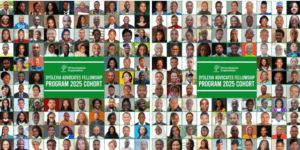In a step toward inclusion and educational equity, the Africa Dyslexia Organisation has launched its second Dyslexia Advocates Fellowship Programme, bringing together a diverse cohort of 246 change-makers from 35 African countries.
These individuals are on a mission to dismantle barriers, challenge stigma and champion opportunities for people with dyslexia – a group that is often overlooked yet holds incredible potential.

Dyslexia in Africa: The untold story
In Africa, where awareness and resources for learning disabilities remain limited, dyslexia often goes undiagnosed or misunderstood. This lack of recognition denies millions of children and adults the support they need to thrive.
The Dyslexia Advocates Fellowship seeks to address this gap by equipping leaders with the tools to transform their communities and bring visibility to the challenges faced by individuals with learning differences.
As a dyslexic herself, Rosalin Abigail Kyere-Nartey, Founder and Executive Director of the Africa Dyslexia Organisation, understands the urgency of this mission. “I struggled to read and write until I was 17 not because I was lazy or unintelligent, but because no one understood I was dyslexic. This fellowship is about ensuring no one else has to face that isolation,” says Kyere-Nartey.
The 2025 cohort: A force for inclusion
The newly-inducted fellows represent an unprecedented pan-African collaboration. Coming from varied professional backgrounds – teachers, entrepreneurs, healthcare workers, policy advocates and more, they share a singular vision: to create a future where every child, regardless of their learning differences, can succeed.
The programme empowers these advocates with intensive training in multi-sensory teaching methods, community mobilisation and policy advocacy. Fellows will return to their communities equipped to lead initiatives that:
- Foster inclusive education through teacher training and school reform.
- Advocate for neurodiverse-friendly policies in workplaces and institutions.
- Build support networks for families of children with dyslexia.
These efforts aim to break the cycle of marginalisation that has held back generations of neurodiverse individuals in Africa.
A movement rooted in grassroots leadership
What sets the Dyslexia Advocates Fellowship apart is its emphasis on grassroots change. This is not a top-down initiative but a movement driven by those who live and work in the communities they seek to transform.
By investing in local leaders, the fellowship ensures that its impact is sustainable and far-reaching. “Our fellows are not just advocates, they are architects of change,” says Kyere-Nartey. “They are building a world where dyslexia is not a barrier but a strength.”
The 2025 Dyslexia Advocates Fellowship is not just a story about Africa, it is a global call to action. In a world where 1 in 5 people are affected by dyslexia, this programme offers a blueprint for addressing learning differences through community empowerment, education and policy reform.
The initiative aligns with the United Nations Sustainable Development Goals, particularly SDG 4 (Quality Education) and SDG 10 (Reduced Inequalities), reinforcing the idea that inclusion is central to sustainable development.
As the 2025 cohort embarks on this journey, the Africa Dyslexia Organisation is calling on governments, businesses and civil society to support this transformative work. By fostering partnerships and expanding resources, we can ensure that every child, whether in a bustling city or a remote village, has access to the tools they need to succeed.
The Dyslexia Advocates Fellowship is more than a programme, it is a movement to rewrite the narrative of dyslexia in Africa. It is a story of resilience, innovation and the belief that every individual has the potential to thrive when given the opportunity.
Join us in celebrating the 2025 cohort of the Dyslexia Advocates Fellowship and in building a future where learning differences are understood, accepted and celebrated.
Source: Africa Dyslexia Organisation










